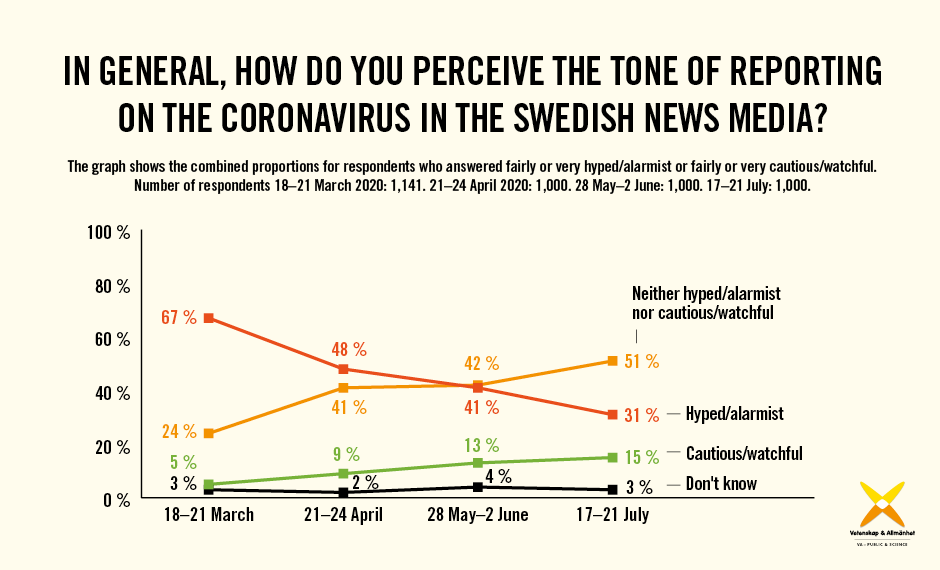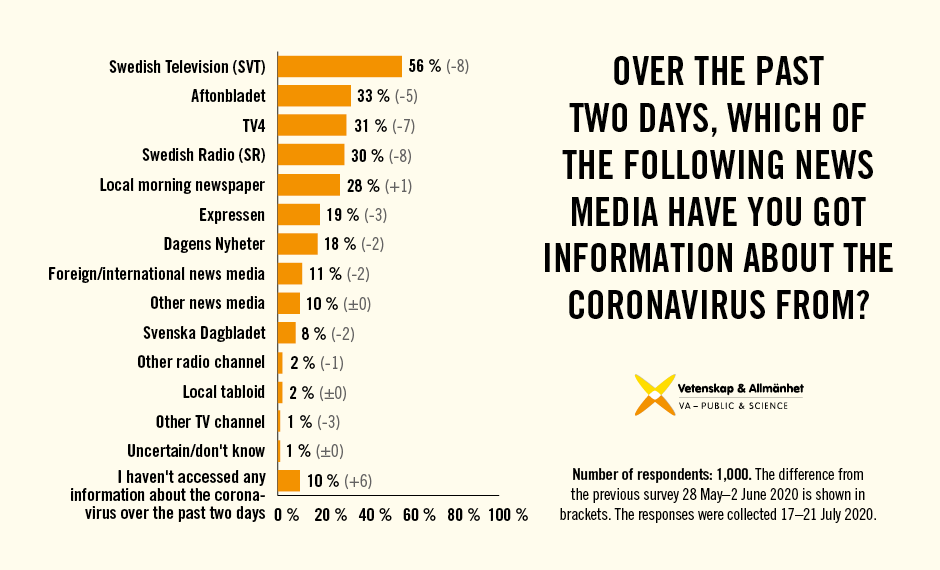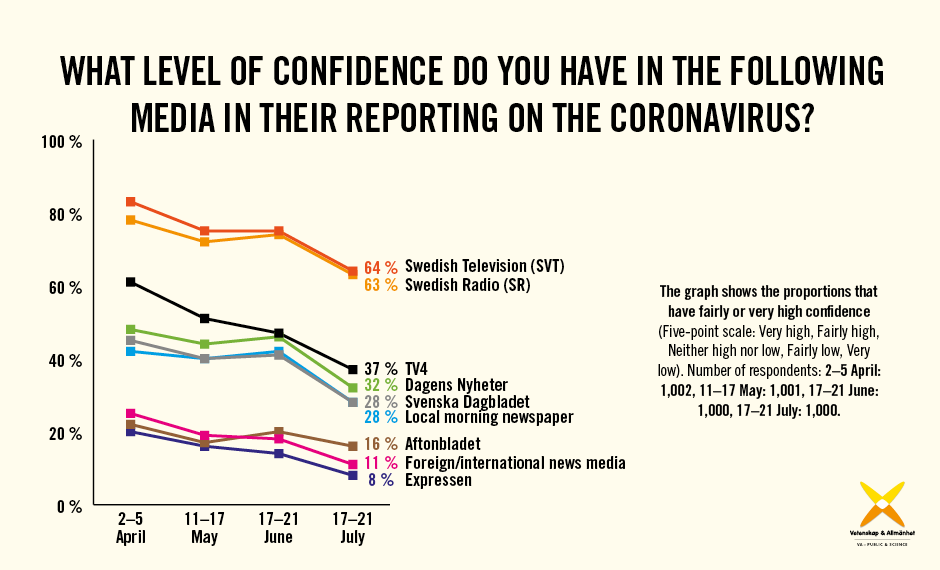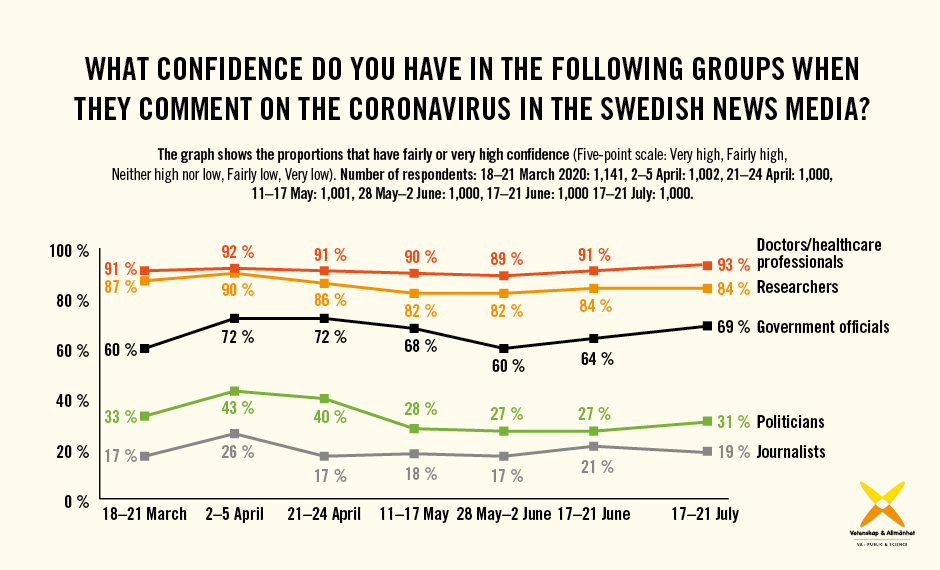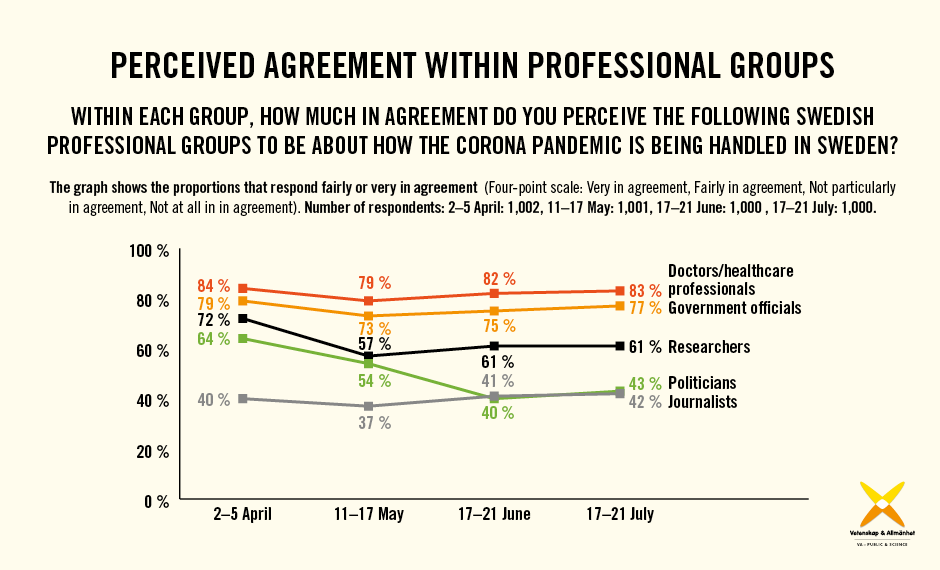Swedes perceive the tone of reporting on the coronavirus in the media as less hyped/alarmist than they did prior to the summer. Public confidence in the media is decreasing but has strengthened for government officials. These are the latest findings of a study on reporting of the coronavirus in the Swedish media being conducted by the Swedish non-profit organisation VA (Public & Science).

In collaboration with researchers from the Karolinska Institute and Södertörn University, VA (Public & Science) is conducting a study of how people are receiving and interpreting information about the coronavirus and the ongoing pandemic. Here, we present the findings from the seventh wave of the survey, which was undertaken between 17 and 21 July 2020.
Less alarmist tone of reporting
The tone of reporting on the coronavirus in the Swedish media is perceived to be less hyped or alarmist compared to when this was previously measured. Three out of ten Swedes (31 percent) now perceive the tone to be fairly or very hyped/alarmist. This is a decrease of ten percentage points since the end of May/beginning of June and 36 percentage points lower than in March. The proportion of Swedes who perceive the tone to be fairly or very cautious/watchful has gradually increased from 5 percent in March to 15 percent in this wave.
Supporters of the Moderate Party perceive the reporting to be hyped to a greater extent than others, with 41 percent responding fairly or very hyped/alarmist. Supporters of the Left Party perceive the reporting to be the least alarmist, with a corresponding figure of 23 percent.
Reduced news consumption during the summer
A decrease in the consumption of corona-related news can be seen in July for most media channels, compared to when this was previously measured. Swedish Television (SVT) is, as previously, the most common source of news about the coronavirus, followed by the tabloid Aftonbladet, TV4, Sveriges Radio and local morning newspapers.
One in ten Swedes (10 percent) has not consumed any news about the coronavirus during the preceding two-day period, which is the largest proportion since the survey began. It is predominantly younger people who have not consumed any news. Among people aged between 18 and 29, one in five (20 percent) has not accessed information about the coronavirus in the preceding two days, compared to one in fifty (two percent) among people aged 65 or older.
Confidence in the media’s reporting is declining
Confidence in various media’s reporting on the coronavirus is declining across all media. The largest decrease, by 14 percentage points, can be seen for the newspaper Dagens Nyheter and local morning newspapers, followed by Svenska Dagbladet, which has decreased by 13 percentage points. This is most likely due to less news being consumed during the summer. Notably, the proportion of Swedes that say they have low confidence has not actually increased, but instead a larger proportion respond that they don’t know/don’t have an opinion compared to in previous waves.
Some differences can be seen between men and women’s confidence in different media. Men have less confidence in Dagens Nyheter, Svenska Dagbladet, Aftonbladet, Swedish Television (SVT), Swedish Radio and TV4, but greater confidence in foreign/international media compared with women. There are no differences for local morning newspapers and the tabloid Expressen.
Confidence in government officials is increasing
Following a decline in confidence in government officials at the end of the spring, confidence has strengthened by nine percentage points since the beginning of June. There is greater confidence in government officials among women compared with men, and among supporters of the parties in government compared, in particular, with supporters of the Christian Democrats and the Sweden Democrats.
For other professional groups that comment on the coronavirus in the news media, no significant differences in confidence can be seen in the last two waves. Confidence is still highest for doctors and other healthcare professionals as well as for researchers. Confidence in researchers who comment on the coronavirus is greater among women than men and among supporters of the Green Party and the Left Party compared with those of other parties.
Agreement among professionals
Agreement within different professional groups with regard to the handling of the pandemic in Sweden is perceived in the same way as in the penultimate survey undertaken in June. Doctors and other healthcare professionals are still perceived as the group that is most in agreement, followed by government officials and researchers. Men perceive politicians, journalists and government officials to be less in agreement compared to women.
About the survey
The survey was conducted by Kantar Sifo and consisted of 1,000 interviews with a web panel based on random sampling. The interviews were conducted 17 –21 July. The results are weighted based on gender, age and region of residence.
In order to monitor the Swedish public’s news consumption, confidence in key professional groups and attitudes towards media reporting over time, we are conducting a number of studies during the course of the pandemic. During the autumn, we will undertake a content analysis of reporting on the coronavirus in the Swedish media in order to map any changes in reporting during different phases, and how this relates to public attitudes during the same time period.
The study is being conducted with the support of the Anne-Marie and Gustaf Anders Foundation for Media Research, LIF – the Swedish Association of the Pharmaceutical Industry, the Wenner-Gren Foundations and the Swedish Research Council.
Read more about VA’s study and the results of the first, second, third, fourth, fifth and sixth waves of the study.

